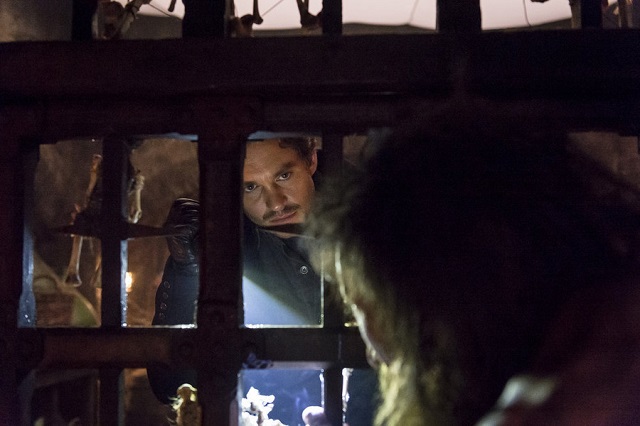Kate’s Classical Corner: Hannibal, Ep. 3.03, “Secondo”
As a classical musician, I can’t help but be influenced in my interpretation of Hannibal by its amazing score and soundtrack, composed and compiled by music supervisor Brian Reitzell. This is not intended to be a definitive reading of Reitzell or showrunner Bryan Fuller’s intentions in regards to the music, but rather an exploration of how these choices affect my appreciation of the given episode. Read my review of “Secondo” here.
Classical pieces featured:
Piano Concerto No. 2 in B-flat major, Op. 19, II. Adagio by Ludwig van Beethoven (1795): Dinner with Sogliato
While this is a lovely piece, it is a fairly straightforward choice for Hannibal’s dinner with Sogliato. The only thematic ties I note in its selection are that it was the first piano concerto composed by Beethoven (though it was published after Piano Concerto No. 1 in C major, Op. 15). In this scene, Hannibal is at his most juvenile (“That may have been impulsive”), so it follows that the piece he selects to accompany the meal is early Beethoven, rather than his much more tonally complex and developed later works.
Tornami a dir che m’ami from Don Pasquale by Gaetano Donizetti (1810): Dinner of Sogliato
Taken from the final scenes of Donizetti’s Don Pasquale, Tornami a dir che m’ami (which translates as “Say again that you love me”) is a love song sung by the young lovers Norina and Ernesto. Reitzell used another excerpt from Don Pasquale in the season premiere, “Sogno soave e casto”, which saw Ernesto pining for Norina, so this is a natural pairing. The beauty and lyricism of the aria underline the grotesque decadence of the meal of Sogliato’s organs, which Hannibal’s guests devour with gusto.
Fantaisie-Valse by Erik Satie (1885): Hannibal decides how to forgive Will
One of Satie’s first compositions for the piano, Fantaisie-Valse is a playful, short piece, a bit of an odd choice for a conversation this dark, at least to the audience. However, it ties into the notion of Hannibal’s decision to eat Will as a simplistic solution to his problem and perhaps not the most mature response to Will’s offer of forgiveness.
- The scoring for Will is very different throughout the episode than the scoring for Hannibal. Whereas Will’s scenes are densely scored, with layered percussion, strings, organ, and other instruments, Reitzell takes a light hand with Hannibal’s conversations with Bedelia, allowing the rhythm and timbre of their voices to score much of the scene.
- Jack returns to the series in a triumphant moment, accompanied by the heartbeat motive first heard in “Primavera”. That heartbeat connects Jack to the heart stag (or stagenstein, or thing-giving-me-nightmares, or whatever we’re calling it now), as Jack first appears at the Norman Chapel, but it’s also a sign of his virility and strength. Will is in a dark place in this episode, whereas Jack is only in Italy to look after Will, making him, rather than Will, the heart of the series, for now.
- The mist-shrouded cottage on the edge of the forest, at the Lecter estate, instantly calls to mind Grimms’ fairy tales and the scoring accompanying its introduction, including strings, bowed percussion, and white noise, adds to the atmosphere of the scene.
- There is a lot of very evocative scoring in this episode, referencing the repeated imagery of broken glass and distorted reflections. A tinkling, percussive sound is particularly prominent in the scoring for Will’s mind palace therapy session with Hannibal, Will’s discovery of the firefly-surrounded fountain, and Will’s presentation, to himself, of his tableau, Chiyoh’s prisoner adorned with broken glass wings. Along with this light sound, the fountain scene mimics the buzzing of the insects and as Will walks down to the dungeon, a rainstick stands in for the sound of water that the prisoner is allowed, his only connection to the rest of the world.
- Speaking of Chiyoh, her immediate reaction to being manipulated into killing is very different from Bedelia’s in “Antipasto”, though her conversation with Will is not dissimilar to Bedelia and Hannibal’s. Her anger and horror is reflected in the distorted electric guitar scoring, a very different sound than that used for Will or Hannibal’s kills, or most of the other deaths shown over the course of the series.
For even more Hannibal talk, check out the podcast I cohost with Sean Colletti, This Is Our Design, this week with special guest Vincenzo Natali!



